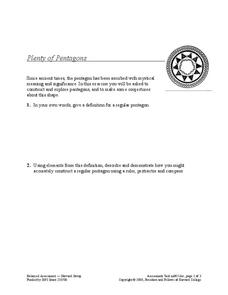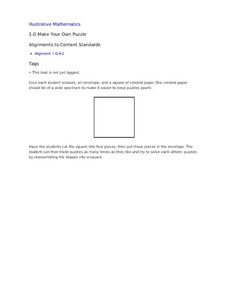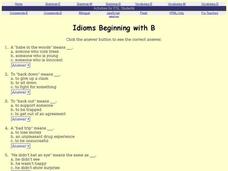EngageNY
Least Common Multiple and Greatest Common Factor
Find the common denominator between prime factors, factor trees, and the distributive property. Scholars learn to find the least common multiple and greatest common factor of pairs of numbers. They rotate through stations to connect...
Balanced Assessment
Compact-Ness
Creating a definition may be easier than it sounds! Give your classes experience creating their own definition. Scholars examine the meaning of the compact-ness of a scatter plot and create their own definitions based on measurements.
EngageNY
Markup and Markdown Problems
There is a 100 percent chance this resource will help pupils connect percents to financial literacy. Young mathematicians use their knowledge of percents to find markups and markdowns in financial situations in the seventh segment in a...
Balanced Assessment
Sharp-Ness
Transform pupils into mathematicians as they create their own definitions and formulas. Scholars examine an assortment of triangles and create a definition and formula for determining the sharpness of the vertex angle. The groups of...
Illustrative Mathematics
Planes and Wheat
Understanding government spending is difficult. The number of variables can be enormous. In the corresponding resource, number crunchers are given one equation related to government spending with a number of variables. Your class is...
Barbara Kowal
Winter Vocabulary Quiz
Asses scholars' vocabulary skills with a winter-themed multiple choice quiz. Learners read a short definition and choose from one of four words it describes.
Balanced Assessment
Curvy-Ness
Curves ahead! Develop a numerical measurement of curvy-ness. The class is challenged to come up with a definition of curvy that can be applied to curves. The class members use their defined measurement to describe a curve.
George W. Bush Presidential Library and Museum
Teaching Primary and Secondary Sources
What makes a source primary or secondary? Middle schoolers read a definition of each term before exploring different examples and applying their knowledge to a research project.
Illustrative Mathematics
Finding an Unknown Angle
Teach your class how to apply their knowledge of geometry as they explore the unknown. In order to find an unknown angle, students must understand that rectangles have four interior right angles, that right angles have 90 degrees, and...
College Board
2005 AP® Calculus AB Free-Response Questions
Develop an awareness of the exam. Pupils and teachers use the six release free-response questions to see how the exam covers topics. The questions are divided among calculator and non-calculator items. Scholars see the importance of...
College Board
2006 AP® Calculus BC Free-Response Questions
Move along with the review. Teachers and scholars use the six released free-response questions to review for their upcoming AP® exam. Questions from the 2006 exam contain problems dealing with cars, objects moving along a curve, and...
College Board
2005 AP® Calculus BC Free-Response Questions
Differentiate between the exams. Using the Q&A document, teachers compare the free-response questions that BC test-takers see to those that AB test-takers see. The pupils see which questions come from AB content and also those that...
College Board
2005 AP® Calculus AB Free-Response Questions Form B
Grab a peak inside the test. The 2005 free-response questions from the AP® Calculus exam allow learners to see how topics appear on the tests. Topics cover differential equations, bounded areas, particle motion, and slopes of tangent lines.
College Board
2010 AP® Calculus AB Free-Response Questions Form B
Most say that practice makes perfect. Scholars use the released free-response questions to practice for the AP® Calculus AB exam. Each question comes with several parts and either do or do not allow calculators. Items include topics such...
College Board
2011 AP® Calculus BC Free-Response Questions Form B
Take a second look. Form B of the AP® Calculus BC free-response questions allow pupils and teachers to see another set of items. The six questions expand the set of items from the 2011 free-response questions. Form B items include a...
Charleston School District
Pre-Test Unit 4: Linear Funcitons
Let your classes show you what they know! Use this pre-test to assess the current knowledge of your learners. The assessment includes all pre-algebra concepts related to functions: writing and graphing linear relationships, comparing...
Illustrative Mathematics
Area of a Trapezoid
Here is a straightforward example of how to apply the Pythagorean Theorem to find an unknown side-length of a trapezoid. Commentary gives additional information on proving that the inside of the trapezoid is a rectangle, but is...
Curated OER
Is This a Rectangle?
How do you show that something is a rectangle? This activity starts with four coordinate points and asks young geometers to explain whether they create a rectangle. Knowledge from both geometry and algebra come into play here, as well...
EngageNY
The Relationship Between Visual Fraction Models and Equations
Ours is to wonder why, not just to invert and multiply. The seventh installment of a 21-part module uses fraction models to help pupils understand why the invert-and-multiply strategy for dividing fractions works. They then work on some...
Balanced Assessment
Plenty of Pentagons
Why are only four colors needed to color webs from regular pentagons, not five? An assessment task requires young mathematicians to first construct regular pentagons using a compass and straightedge, then has them consider a shape...
EngageNY
Constant Rate
Two-variable equations can express a constant rate situation. The lesson presents several constant rate problems. Pupils use the stated constant rate to create a linear equation, find values in a table, and graph the points. The resource...
Illustrative Mathematics
Make Your Own Puzzle
Puzzling over what geometry lesson to teach next? Look no further. This simple activity teaches young mathematicians how shapes can be decomposed into smaller figures, and how smaller figures can be assembled into larger shapes. To learn...
Curated OER
Automobile Vocabulary
In this interactive vocabulary worksheet, students answer 10 multiple choice questions based on their knowledge of car parts and their definitions.
Curated OER
Idioms Beginning With B
In this idioms learning exercise, students complete a 10 question multiple choice on-line interactive quiz about idioms beginning with letter B. Students read the idiom and choose the definition. Example: back down, back out, bat an eye.























